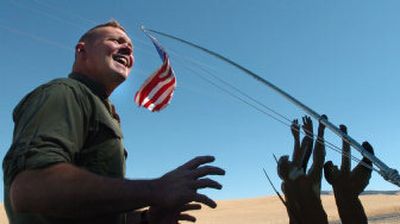Latah farmer proud of his flag-raising

In college, John Heaton and Chris Herion always talked about the “heavy stuff” over beers.
The teenagers, who met in an international politics class, Poly Sci 222 at Washington State University, would talk about foreign affairs and war, the Cold War to be exact. It was 1988, the last of the Reagan years. The U.S. government and USSR were still blowing up nukes underground in anticipation of someday having to launch them at each other.
Heaton and Herion would get to the bottom of their mugs and wind up talking about the Marine Corps.
“Hey, maybe we ought to run down and enlist, just like our forefathers,” one of them would say. Heaton or Herion, it didn’t really matter. They’d talk about it often but never go see the recruiter. They were sophomores when the U.S. invaded Panama. The assault was the first non-Cold War use of U.S. forces since 1945 and lasted 14 days. Afterward, when the Corps came up, the two would say regretfully that they’d missed their chance.
Marines stormed Iraq in the Persian Gulf War a couple years later. Heaton and Herion reasoned they were too close to graduation to just leave school.
Years went by. The two got on with life. Herion went to work at a newspaper in Sunnyside and, later, to law school. Heaton returned to his hometown of Tekoa to take up the family business, which is what he was doing when his college pal called from out of nowhere in 1996 to say recruit Herion was heading to boot camp as a Marine Corps reserve.
“He said, ‘Well, I did it. I joined the Marine Corps,’ ” Heaton recalled recently. “And then he dared me to do it. … I thought we were going to be too old. I was actually 28 when I went to boot camp.”
At 28 or 18, men are changed by the Marine Corps. Once a jeans-and-cowboy-boot kind of guy, Heaton now works his farm in drab green shirts and shorts. His stubbled hair is never more than seven days from its last cut. His feet are shod in desert brown combat boots. And the flag in his Latah front yard – big as a sheet of plywood and mounted to a 30-foot pole of Heaton’s creation – is fit for a courthouse lawn.
Heaton could have sat out the Iraq war, reasoning that his commitment had expired and he had a farm to run, that once again he had missed his chance. But the Marine in him knew better and so he did his tour with Battery P, 5th Battalion, working security at an airbase in Al Asad.
“His family has been farming since the 1900s, and his father and grandfather had farm furloughs (which kept them out of war). John wanted his chance,” said Herion, who ended up serving in a different unit than Heaton and never did make it to Iraq. “I think it made John truly a citizen soldier in the tradition of Cincinnatus, the Roman farmer who became a general then reverted back to farming. It helped both of us grow up.”
A funny story about that flag in Heaton’s front yard south of Latah: After John returned from Iraq, a strong wind bent the flagpole about 45 degrees to the north. As he recalls, the bend occurred in 2005 about Nov. 10, which just happens to be the Marine Corps birthday.
Heaton thought about fixing the pole and got to thinking about the Marines who stood the flag at Iwo Jima, about the famous photo taken by Associated Press photographer Joe Rosenthal. Soon the reserve sergeant had his camera and tripod set up on the front lawn and he was taking stills of himself posing in the position of each of the six men in the iconic photo.
It must have been quite a sight from State Route 27, which borders the property, Heaton clutching the pole with a shotgun strapped to his back and a Kevlar helmet on his head for authenticity.
With his computer, he crafted a life-size stencil from the photos then cut the soldier’s images from rusted sheets of steel. Heaton knew he had the image right when a passing motorist mistook the display for men struggling to raise a flag and stopped to help.
Since then the farmer has arrived home from work to find, tucked in the seam of his screen door, notes of gratitude.
“It’s the first thing I see when I leave in the morning and the last thing I see at night,” Heaton said.
And sometimes he’ll find a Marine standing on his lawn. In which case, Heaton goes out, offers the stranger a beer and a little discussion about the heavy stuff.